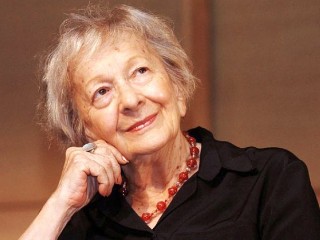
Wislawa Szymborska biography
Date of birth : 1923-07-02
Date of death : -
Birthplace : Kornik, Poland
Nationality : Polish
Category : Famous Figures
Last modified : 2011-09-21
Credited as : poet and essayist, translator, Nobel Prize for literature
0 votes so far
Szymborska frequently employs literary devices such as irony, paradox, contradiction, and understatement, to illuminate philosophical themes and obsessions. Szymborska's compact poems often conjure large existential puzzles, touching on issues of ethical import, and reflecting on the condition of people both as individuals and as members of human society. Szymborska's style is succinct and marked by introspection and wit.
Szymborska's reputation rests on a relatively small body of work: she has not published more than 250 poems to date. She is often described as modest to the point of shyness. She has long been cherished by Polish literary contemporaries (including Czeslaw Milosz) and her poetry has been set to music by Zbigniew Preisner. Szymborska became better known internationally after she was awarded the 1996 Nobel Prize. Szymborska's work has been translated into many European languages, as well as into Arabic, Hebrew, Japanese and Chinese.
Szymborska made her poetical debut in 1945 in a Polish daily newspaper with a poem entitled Szukam slowa/I Seek the Word. In 1952 she joined the Polish Socialist Party (PZPR), and her work was branded as socialist realism which praised communism. However, she later described her disillusion with such politics, particularly after the death of Stalin in 1953, and her work became less political. She joined the editorial staff of the Polish weekly literary newspaper Zycie literackie/Literary Life in 1953, editing the poetry section until 1966, and continuing as a columnist and essayist there until 1981, when she joined the staff of the monthly literary journal Pismo. Her work has been translated and received around the world. As well as her poetry, she has published her group of essays Lektury Nadobowiazkowe/Optional Readings, written from 1967 to 1981.
Szymborska was educated in Kraków, Poland, and attended the Jagiellonian University there, studying sociology (1945-48). As a member of the Polish Writer's Union, in 1957 she was awarded a scholarship to visit Paris, France, as well as the minister of culture and art prize and the prize of the city of Kraków in the 1960s. She was made an honorary doctor of letters by the University of Poznan, Poland, in 1995.
















